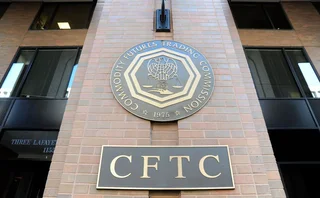
Editor's letter

As Credit went to press, the City of London was an unwilling host to thousands of demonstrators, many marching with a confused message of "jobs, justice, climate". Their choice of targets seemed just as muddled: one focus was the Bank of England, which - whatever one's views of its current policies - is doing its best to find a way through the economic crisis.
Although many of the Square Mile's unwelcome visitors see 'protest' as a hobby, regardless of the cause, no doubt the protestors' numbers were swelled by people unused to taking to the streets, who feel understandable outrage at the turn in their fortunes as the downturn worsens. Credit has always pursued a strong editorial line that there were excesses in the system, and that the urgent - but not precipitate - necessity of some regulatory and procedural change is clear, even if the market has to some extent corrected itself, as markets do. We would, for example, be very interested to hear from anyone who's been sold a new CDO-squared recently.
But justifiable as some level of public grievance might be, it is absurd to lay blame exclusively at the feet of the bankers. Regulators and politicians are at fault too; especially here in the UK, where the tripartite regulatory system was much trumpeted, as was Gordon Brown's claim, as Chancellor of the Exchequer, to have abolished boom and bust.
But it's not just the powerbrokers in government, the financial wizards on structured credit desks, or yield-hungry institutional investors who are to blame. For all their evident and myriad faults, the system required participation from the consumer. No-one had to take a 100% mortgage, and for every aggrieved Icesave account-holder there's a saver who one day in the past congratulated himself on getting the 'best' interest rate, forgetting that interest is a measure of risk.
It would be too much to hope that the protestors in the City gave much thought to this truth as they clashed with the police. But on April 1 who did they think was working harder to effect a recovery? The thugs smashing their way into that RBS branch near the Bank of England, or the men and women at their desks?
Matthew Attwood.
Only users who have a paid subscription or are part of a corporate subscription are able to print or copy content.
To access these options, along with all other subscription benefits, please contact info@risk.net or view our subscription options here: http://subscriptions.risk.net/subscribe
You are currently unable to print this content. Please contact info@risk.net to find out more.
You are currently unable to copy this content. Please contact info@risk.net to find out more.
Copyright Infopro Digital Limited. All rights reserved.
As outlined in our terms and conditions, https://www.infopro-digital.com/terms-and-conditions/subscriptions/ (point 2.4), printing is limited to a single copy.
If you would like to purchase additional rights please email info@risk.net
Copyright Infopro Digital Limited. All rights reserved.
You may share this content using our article tools. As outlined in our terms and conditions, https://www.infopro-digital.com/terms-and-conditions/subscriptions/ (clause 2.4), an Authorised User may only make one copy of the materials for their own personal use. You must also comply with the restrictions in clause 2.5.
If you would like to purchase additional rights please email info@risk.net
More on Regulation
US Basel equivalence questioned as EU patience wears thin
MEPs say unfaithful US implementation of Basel III could trigger review of access to EU markets
The Term €STR transition: challenges and market readiness
The progress, challenges and factors shaping the adoption of Term €STR as financial institutions transition from Euribor
CFTC takes red pen to swaps rules, but don’t call it a rollback
Lawyers and ex-regs say agency is fine-tuning and clarifying regulations, not eliminating them
EU edges closer to calming FRTB fund-linked fray
Dealers say temporary solution is a step in the right direction but won’t fully resolve all issues
European Commission changes tune on proposed FRTB multiplier
Banks fear departure from original diversification factor undermines case for permanent relief
Supervisors should be mindful of geopolitical risks, says IMF
Shock events cause sizeable swings in asset pricing, institution’s latest report highlights
Bowman won’t commit to stress-testing the tariff shock
Nominated Fed vice-chair stonewalls calls to run ad hoc scenario similar to 2020 Covid test
Fed’s Bowman to ‘prioritise’ SLR exemption for US Treasuries
Reinstating Covid-era relief is a ‘no brainer’, dealers say, as bond markets reel from tariff chaos







